Hyperdimension Neptunia Producing Perfection Vita Review: Pocket Goddesses
The gang of console personifications aims to dominate Gamindustri in a whole new way.
This article first appeared on USgamer, a partner publication of VG247. Some content, such as this article, has been migrated to VG247 for posterity after USgamer's closure - but it has not been edited or further vetted by the VG247 team.
Hyperdimension Neptunia Producing Perfection is an interesting curiosity that it's honestly surprising to see it get a Western release.
To someone less familiar with the series, it might be surprising that the Western releases of the Hyperdimension Neptunia series have continued as long as they have at all, with its various installments' Metacritic ratings all hovering between the 45 and 55 mark. Not what you might call "critically acclaimed," in other words. And yet Producing Perfection is the fourth game in the series to make it to Western shores, with more to follow.
The reason why the Neptunia series is so popular both here and in its native Japan -- where it has proven successful enough to enjoy an anime adaptation which is also coming West in the near future -- is primarily down to its characters. Its central cast of characters -- each of whom is a female personification of one of the major console manufacturers -- are a memorable bunch, simultaneously encompassing comfortably familiar anime-style tropes and lightly mocking the conventions of both the video game and anime media in the process. There's someone to appeal to most tastes, whether it's the tsundere personification of the PlayStation brand Noire; her sister-with-an-inferiority-complex Uni (who represents the PSP); the grumpy, insular, ruthless Nintendo personification Blanc; or any of the other characters that make up the main cast.
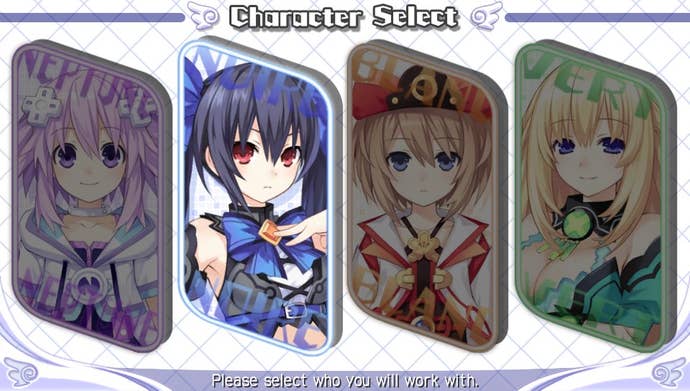
Past installments of the Neptunia series have been role-playing games that unfold through non-interactive visual novel-style scenes punctuated with 3D dungeon-crawling segments and genuinely interesting combat systems. All of these aspects were refined to their finest point in last year's Hyperdimension Neptunia Victory, a title whose surprisingly ambitious plot took a sidelong glance at the overall history of interactive entertainment through a candy-colored lens.
Producing Perfection, meanwhile, abandons a whole ton of the conventions the series has built up to date, and even goes so far as to say on its start screen that it is not canonical to the Neptunia universe's overall plot and shouldn't be taken too seriously. Specifically, there are three main areas in which it differs from the mainline series: it's not an RPG, its plot isn't particularly focused on lampooning the video games industry, and the player is an active participant in the narrative rather than an outside observer occasionally addressed by fourth wall-breaking characters.
Producing Perfection is described as an idol (in the "pop star" sense) management game, a genre of games particularly popular in Japan but which we haven't really seen to date here in the West -- and certainly not as retail releases on platforms such as Vita. In practice, the game is as much life sim or dating sim as it is about idol management -- in fact, the "management" side of things is very lightweight, with minimal resource management involved, and certainly no requirement for you to worry about pesky things like finances, equipment or staff.
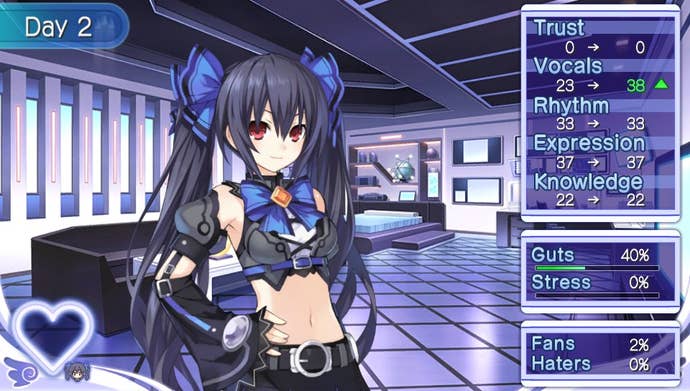
No; gameplay-wise, Producing Perfection essentially boils down to collecting story events. Each in-game day, you can tell your chosen cast member -- you choose one of the four main cast members at the outset of a playthrough -- to do one of several things. They can work in order to increase their fanbase, study to improve their statistics, relax to reduce their stress, interact with you or the other goddesses, move to work in another nation or put on a concert.
Most of these options trigger some sort of visual novel-style event, during which you're occasionally given the option of how to respond. Reaching a particular character's "true" ending is, in true visual novel tradition, a matter of picking the correct options throughout the story, but there are other considerations, too. If your goddess ever reaches 100% stress, you get a bad ending, and likewise if you go for 180 days without "winning" the game. Conversely, it is possible to "win" the game with a "good" ending before you've seen all the story events necessary to see the true ending, so particularly once you've built up your godess' stats for a New Game Plus runthrough, you have to actually be careful not to perform too well, lest you bring your playthrough to a premature conclusion.
The game's trophy list encourages obsessiveness over seeing all the different endings and collecting 100% of the events for each of the four goddesses, and indeed the game provides an additional reward for those who see everything all the four main paths have to offer. You can still have a satisfying experience simply playing through each path once or twice and seeing how well you can perform, but you'll get the most out of the game if you try to strategically uncover all of the available events as efficiently as possible. Whether or not you'll enjoy this is, of course, a matter of taste, but this brings us neatly onto the game's core appeal element: the opportunity to spend time hanging out with the Neptunia gang on a hitherto-unprecedented scale.
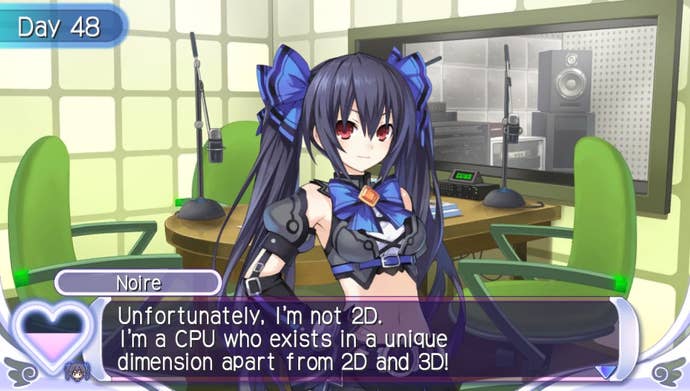
Producing Perfection is a game designed specifically for Neptunia fans, you see; while the series as a whole is aimed squarely at the broader "otaku gamer" market, this title assumes a certain degree of knowledge of the series as a whole, and indeed makes no qualms about the core of its experience being the opportunity to virtually hang out with Noire, Vert, Blanc or Neptune. You get to spend time with them going about their daily life, finding out more about their character. The idol management aspect provides a good excuse for the game to mock a few common anime tropes as well as the distinctly Japanese concept of idol culture -- the sight of the usually headstrong and determined Noire trying her best to play the role of a clumsy maid is a particular highlight, for example. And the dating-sim aspect of the game, allowing the player themselves to build a close personal relationship with their goddess of choice, will be a dream come true for those who fell in love with the characters long ago.
There's something interesting about this latter aspect, though. While the Neptunia series as a whole is regarded as typical, male-oriented otaku gamer fare -- and the boob-jiggling event scenes in the RPG installments certainly don't do much to argue with that viewpoint -- it also has strong yuri undertones thanks to its all-female cast and the understated, matter-of-fact way in which many of the characters are strongly implied to be if not gay then certainly bisexual. These implications -- which are a matter of some debate among some Neptunia fans -- put a dating sim-style installment of the series in an interesting position.
Producing Perfection deftly sidesteps this issue somewhat, however, by allowing you to name the unvoiced protagonist character whatever you like, and then referring to you/them throughout either by name or as "producer" or "manager" rather than using gendered pronouns. There are certain scenes throughout that are clearly based on the conventions of a male protagonist in a romance-style anime story -- the familiar crowd scene in which the protagonist feels gets unavoidably squished up against the heroine, then subsequently branded a "pervert" through no fault of their own is just one example -- but even these remain seemingly free of assumptions about the player's gender.
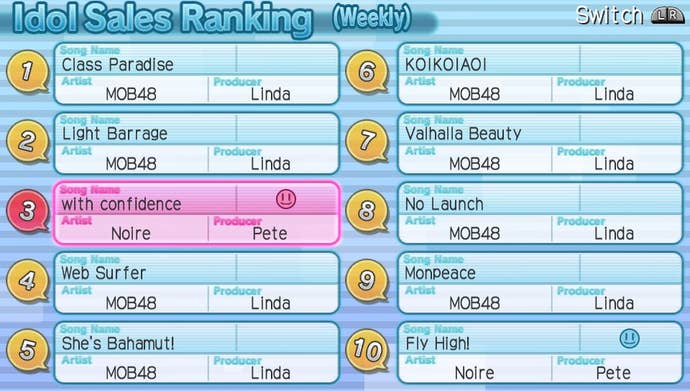
You'll notice that throughout this review I haven't mentioned the "concert" gameplay as yet, and that's deliberate; under no circumstances should you go into this title expecting a "music game" a la Project Diva. In fact, since the main focus is very much on the event scenes, the concert gameplay is a relatively minor part of the whole experience, and is instead primarily used as a means of buffing up your chosen goddess' share of the world's fans, which subsequently brings you closer to "winning" a playthrough -- not always something you want to do if you're going for a character's true ending!
Performing a concert is a strange experience. You're not in control of the performer and you're not playing a rhythm game; instead, you're controlling camera angles and setting off special effects on the stage. As you move the camera around, change angles and set off various pyrotechnics when the crowd starts chanting, you'll build up a meter in the corner of the screen, and the higher this is at the end of the song, the better your score and the bigger the goddess' gain in fans. There's not a lot of real depth to this side of gameplay; success can largely be attained by moving the camera as much as possible and simply listening out for audible cues to set off the effects. This simplicity does, however, afford you the opportunity to enjoy the songs and the excellent dance animations as well as giving you a short break from all the reading. It would not be enough to carry the game by itself, however, so it was a sensible choice to downplay this aspect's importance in favor of the more visual novel/dating sim-style gameplay.
The big question, then, is whether or not there's anything here for someone who isn't already invested in the Hyperdimension Neptunia series. And that's a difficult one to answer, really; while the core appeal element of the game is, as previously mentioned, the opportunity to spend some virtual time hanging out with the Neptunia girls at a time when the world isn't being threatened by the forces of software piracy or the personification of a disgruntled former gaming giant, Producing Perfection is, in many ways, one of the most accessible installments in the series. The more ecchi content of the past installments is considerably toned down in favor of enjoyable interactions that give you a greater understanding of the characters involved -- and the cast is more than strong enough to carry a game based almost entirely on interpersonal interactions. The story stands by itself, too, making no reference to past Neptunia games save for the fact that the goddesses all know each other already; without a doubt, you'll get more out of it if you already know the characters involved, but it's far from impenetrable to a newcomer.
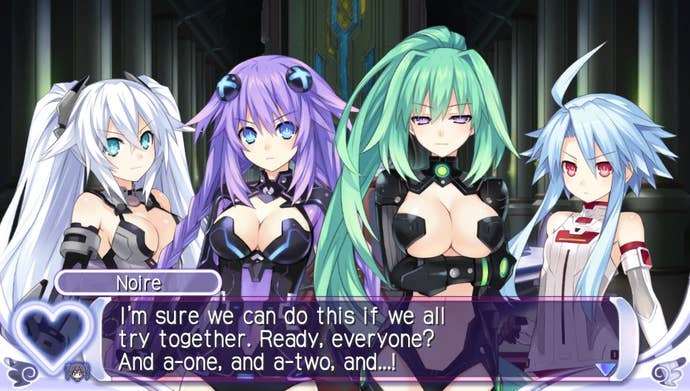
Whether or not Producing Perfection is a worthwhile purchase for you, then, dear reader, boils down to whether or not you like the sound of a game that is about very little other than talking and experimenting with various options in order to try and see all the possible events available, of which there are many. The dialogue is well-written, enjoyable and more than enough to carry the game by itself for those accustomed to the conventions of dating sims and visual novels, but those preferring titles with a little more gameplay meat on the bones may come away disappointed. I, personally, absolutely adored it, but then I'm a big Neptunia fan anyway and thus it feels like this game was specifically designed to appeal to me.
That's not necessarily a bad thing, though, and designing for a small, tightly focused audience rather than aiming for broad mass market appeal is a luxury that smaller, niche developers get to take advantage of a whole lot more than big-budget triple-A companies. Producing Perfection is a fine example of that tight focus being used effectively, and thus I'd declare it a resounding success at what it's trying to do.
VisualsAs usual for the Neptunia series, the 2D art is beautifully designed, with distinctive character designs and vibrant colors everywhere; interestingly, this game also features the best character models and 3D framerate of the whole series, too.
SoundA lot of recycled music tracks from earlier Neptunia games, but the characters' distinct "image songs" for their concert sequences are all catchy, memorable and have obviously had some effort put into them. Dual audio voice acting is consistently excellent in both languages.
InterfaceWith such simple gameplay, it's hard to get a game like this wrong, but there are some nice quality of life features such as previously-chosen dialogue options being highlighted in a different color, making it easy to see everything.
Lasting AppealA single playthrough of one goddess will take a single-digit number of hours... but if you get that far, you won't want to stop until you've seen everything, which will take a whole lot longer.
ConclusionWhile light on what we'd traditionally call "gameplay" and aimed at an even more specific audience than your typical modern Japanese games, Producing Perfection is a solid, character-driven experience that is a lot of fun.






